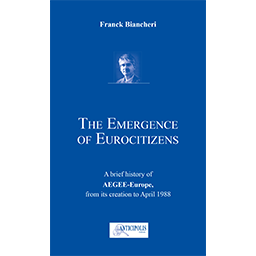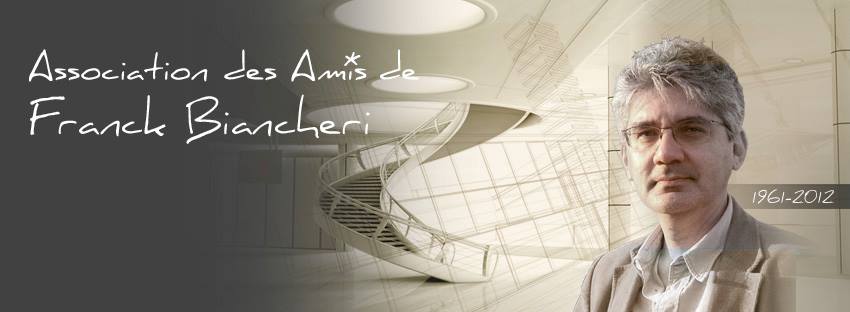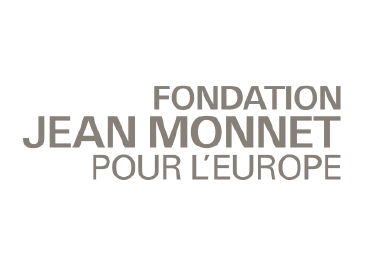[:en]
 From July 1st to 7th, the AEGEE-Angers antenna is organising a week-long event on the theme “Being Franck Biancheri in 2019 … imagine the horizont 2040” (Franck Biancheri Award 2019). In the perspective of this event, but also in the general context of mistrust of peoples (sovereignism, yellow vests, brexit …) and disconnected and overwhelmed elites by the complexity of the European/national systems, it seems to us quite appropriate to republish the work that had been directed by Franck Biancheri as part of the Europe2020 project. A first series of 5 seminars, aimed mainly at national and European decision-makers, was organized on the theme “How to manage the EU in 2020” between October 1999 and July 2000. Each of these seminars addressed a specific theme: the need for reforms, administration, democracy, geopolitics, political transition … The summary notes of these seminars can bring many elements of reflection to understand the bankruptcies, the excesses but also the progresses of the last twenty European years, and to take solutions and useful tools for citizens and their decision makers today, while rethinking and adapting them to the world of tomorrow.
From July 1st to 7th, the AEGEE-Angers antenna is organising a week-long event on the theme “Being Franck Biancheri in 2019 … imagine the horizont 2040” (Franck Biancheri Award 2019). In the perspective of this event, but also in the general context of mistrust of peoples (sovereignism, yellow vests, brexit …) and disconnected and overwhelmed elites by the complexity of the European/national systems, it seems to us quite appropriate to republish the work that had been directed by Franck Biancheri as part of the Europe2020 project. A first series of 5 seminars, aimed mainly at national and European decision-makers, was organized on the theme “How to manage the EU in 2020” between October 1999 and July 2000. Each of these seminars addressed a specific theme: the need for reforms, administration, democracy, geopolitics, political transition … The summary notes of these seminars can bring many elements of reflection to understand the bankruptcies, the excesses but also the progresses of the last twenty European years, and to take solutions and useful tools for citizens and their decision makers today, while rethinking and adapting them to the world of tomorrow.
We begin with the republication of the executive summary of the launching seminar which was organised in Paris, Centre Kléber, on 22 and 23 April 1999 with the partnership of the French Ministry of Foreign Affairs and the support of the European Commission.
[divider]
Seminar ’How to run the EU in 2020 ?’ / Launch
Paris (Centre Kléber), April 22-23, 1999
Executive summary (23/04/1999)
Along the two days of seminar a great convergence in the analyses was to be observed among the various participants whatever institution they came from. These analyses can be summed up in three main chapters to be explored more into details within the next working sessions to take place in Bonn, The Hague, London and Brussels from October 1999 on.
1. A general crisis of the European Union institutions
The Commission’s recent crisis is only the visible part of a general crisis of the European Union institutions, whose administrative functioning methods remain founded on organisational methods dating back to the 50’s. The evolution of European societies as well as the increasing integration process in the European Union have led the European administrative system to suffer from very serious harms, characteristic of a system in a process of bureaucratisation. The coming passage to Euro plays a part of catalyst in those deficiencies henceforward belonging to the public sphere. The increasing demand for transparent methods of public management reinforces these tendencies, just as the massive advent of new information technologies does. The « closed up » game (far from the citizens, reserved to the administrative and political elite) and the « drawn game» (all acquired power to the one part is lost for the others) have been at the basis of the system for the last 40 years. It is the end of this managing method that the year 1999 has expressed through its European crises.
2. The necessary acquisition of a democratic legitimacy
Along the next 20 years, the European administrative system will have to provide evidence of its ability to manage a Union closely involving the peoples, and to face the hazards of History. It must therefore root its functioning mechanism in three main values likely to help play this role: transparency, democratisation of its decision-making processes and efficiency of its action. Thanks to more transparent internal functioning mechanisms, to renewed control procedures and through a real communication policy, transparency and efficiency will be made possible. By recognising the politicisation of the European project and by supporting the emergence of a Euro-political class specifically trained to manage the European Union, it will become possible to see the emergence of a Euro-citizenship, only warrant of democratic and historical anchorage of the European Union.
3. Some fundamental reforms to allow the management of the European Union in 2020
The European administrative system should soon see an end to its pyramidal functioning method (European level>national level>regional level) and head towards the network method (functional definition, not hierarchical). This modification implies a rethinking not only of the Commission but also of national administration at least in their relation to European topics. This evolution might lead to a fundamental geographical reorganisation of the European institutional area. The European Central Bank already illustrates the emergence of this new administrative organisation type. Within the European administrative system, a redefinition of roles is becoming necessary in the perspective of 2020: a more collegial Commission playing a part of executive stimulation; a Presidency designed to ensure action coherence; a Council heading towards a Chamber of States; a Parliament which has to learn how to touch its citizens. An in-depth reform of the Commission’s human resources management and control procedures must be initiated by year 2000 in order to avoid the Euro to be implemented with a weakened executive. For a controlled transition process, the definition and implementation of a strong and coherent communication policy is to take place as soon as possible. At the heart of this policy, it appears necessary to find a great mobilising political project imperatively structured along the concept of « common democracy », just as there was a Single Market or a Single Currency. Such a project would play the part of « political locomotive » for the next decade and constitute the integrationist solution to enlargement.
However one should not underestimate that the current crisis is only the initial stage of the profound upheavals that will affect the European system in the next decades. From now on, internal and external crises are part of European Union’s daily life (since the « mad cow », the rhythm of critical events accelerates). Paradoxically this situation reinforces the need to endow the European Union with an efficient anticipation organism, capable of alerting all decision-makers before the release of crises. Finally one should keep in mind that a great part of the causes (organisational as well as human) which led to the current crisis is still present and active within the European administrative system; and that it might resist to changes.
[divider]
(This summarye was written by Franck Biancheri and Marie-Hélène Caillol for Europe2020
©LEAP2020 /2019)
[:fr] Du 1er au 7 Juillet prochain, l’antenne AEGEE-Angers organise un évènement d’une semaine sur le thème « Dans la peau de Franck Biancheri en 2019… imaginant l’horizon 2040 » (Prix Franck Biancheri 2019). Dans la perspective de ces travaux, mais aussi dans le contexte général de méfiance des peuples (souverainismes, gilets jaunes, brexit…) et d’élites déconnectées et dépassées par la complexité du système européen/national, il nous parait tout à fait opportun de republier les travaux qui avaient été dirigés par Franck Biancheri dans le cadre du projet Europe2020. Une première série de 5 séminaires, qui s’adressaient essentiellement aux décideurs nationaux et européens, avait été organisée sur le thème “Comment gérer l’UE en 2020 ?” entre octobre 1999 et juillet 2000. Chacun de ces séminaires aborde une thématique spécifique: nécessité de réformes, administration, démocratie, géopolitique, transition politique… Les notes de synthèse de ces séminaires peuvent apporter nombre d’éléments de réflexion pour comprendre les faillites, les dérives mais aussi les avancées de ces vingt dernières années européennes, et se saisir des solutions et des outils utiles pour les citoyens et leurs décideurs aujourd’hui, tout en permettant de les repenser et de les adapter au monde de demain.
Du 1er au 7 Juillet prochain, l’antenne AEGEE-Angers organise un évènement d’une semaine sur le thème « Dans la peau de Franck Biancheri en 2019… imaginant l’horizon 2040 » (Prix Franck Biancheri 2019). Dans la perspective de ces travaux, mais aussi dans le contexte général de méfiance des peuples (souverainismes, gilets jaunes, brexit…) et d’élites déconnectées et dépassées par la complexité du système européen/national, il nous parait tout à fait opportun de republier les travaux qui avaient été dirigés par Franck Biancheri dans le cadre du projet Europe2020. Une première série de 5 séminaires, qui s’adressaient essentiellement aux décideurs nationaux et européens, avait été organisée sur le thème “Comment gérer l’UE en 2020 ?” entre octobre 1999 et juillet 2000. Chacun de ces séminaires aborde une thématique spécifique: nécessité de réformes, administration, démocratie, géopolitique, transition politique… Les notes de synthèse de ces séminaires peuvent apporter nombre d’éléments de réflexion pour comprendre les faillites, les dérives mais aussi les avancées de ces vingt dernières années européennes, et se saisir des solutions et des outils utiles pour les citoyens et leurs décideurs aujourd’hui, tout en permettant de les repenser et de les adapter au monde de demain.
Nous commençons par la publication de la note de synthèse du séminaire de lancement qui avait été organisé à Paris, au Centre Kléber, les 22 et 23 avril 1999 avec le partenariat du Ministère français des affaires étrangères et le soutien de la Commission européenne.
[divider]
Séminaire ’Comment gérer l’UE en 2020 ?’ / Lancement
Centre Kléber, Paris – 22 et 23 avril 1999
Note de synthèse (23/04/1999)
Les deux jours de travaux ont permis de constater une grande convergence d’analyse de la part des différents intervenants, quelles que soient leurs institutions d’origine. On peut résumer sous trois grands chapitres les pistes de réflexion dégagées lors de ce premier séminaire. Elles seront explorées plus en détail au cours de prochains travaux à Bonn, La Haye, Londres et Bruxelles à partir d’octobre 1999.
1. Une crise générale des institutions communautaires
La crise récente de la Commission n’est en fait que la partie visible d’une crise générale des institutions communautaires, dont, pour l’essentiel, les modes de fonctionnement administratif sont restés fondés sur des méthodes et des modes d’organisation datant des années 1950. L’évolution des sociétés européennes comme l’intégration croissante de l’Union, ont conduit le système administratif communautaire à souffrir de maux très graves typiques d’une “bureaucratisation” de tout le système. L’arrivée de l’euro joue un rôle de catalyseur de toutes ces déficiences qui désormais sont du domaine public. L’exigence croissante de transparence des modes de gestion publique renforce encore ces tendances tout comme l’arrivée massive des nouvelles technologies de l’information.
Le jeu “fermé” (éloigné des citoyens, réservé aux élites administratives et politiques) et le jeu à “somme nulle”, (tout pouvoir acquis par l’une des parties l’est au détriment des autres), ont constitué les bases du système des quarante dernières années. C’est la fin de ce mode de gestion que vient de signifier l’année 1999 et ses crises européennes.
2. La nécessaire acquisition d’une légitimité démocratique
Au cours des vingt prochaines années, le système administratif communautaire devra faire ses preuves quant à sa capacité de gérer une Union impliquant désormais étroitement les peuples, et faisant face aux aléas de l’Histoire. Il faut donc enraciner son fonctionnement dans un triptyque de valeurs à même de l’aider à jouer ce rôle : la transparence et la démocratisation de ses processus décisionnels et l’efficience de son action.
Par des modes de fonctionnement interne plus transparents, des procédures de contrôle rénovées et une vraie politique de communication, la transparence et l’efficience pourront s’avérer possible. En reconnaissant la politisation du projet communautaire, et en soutenant l’émergence d’une euro-classe politique spécifiquement formée à gérer l’Union europ éenne, il deviendra possible d’assister à l’émergence d’une euro-citoyennenté, seule garante de l’ancrage démocratique et historique de l’Union.
3. Des réformes fondamentales pour pouvoir gérer l’Union européenne en 2020
Le système administratif communautaire doit se dégager rapidement de son mode de fonctionnement pyramidal (niveau européen>niveau national>niveau régional) pour s’orienter vers un mode de fonctionnement en réseau (définition fonctionnelle, non hiérarchique). Cette modification impose de repenser non seulement la Commission, mais aussi les administrations nationales dans leurs rapports aux thèmes européens. Cette évolution conduira certainement à une réorganisation géographique fondamentale de l’espace institutionnel communautaire. La Banque centrale européenne (BCE) illustre déjà l’apparition ce nouveau type d’organisation administrative.
Au sein du système administratif communautaire, la redéfinition des rôles s’impose à l’horizon 2020 : une Commission plus collégiale, assumant un rôle de stimulation exécutive ; une présidence visant à assurer la cohérence de l’action ; un Conseil s’orientant vers une chambre des Etats ; un Parlement qui se doit d’apprendre comment toucher ses citoyens. Une réforme profonde de la gestion des ressources humaines et des procédures de contrôle de la Commission doit être initiée dès l’an 2000 afin d’éviter que la mise en place de l’euro ne se fasse avec un exécutif affaibli.
Pour gérer la transition, la définition et la mise en œuvre d’une politique de communication cohérente et forte s’imposent le plus tôt possible. En son cœur, il apparaît nécessaire de trouver un grand projet politique mobilisateur qui s’axera nécessairement autour du concept de “démocratie commune”, comme il y eut un Marché unique et une Monnaie unique. Ce projet peut servir de “locomotive politique” pour la prochaine décennie, et constituer le pendant intégrationniste de l’élargissement.
Cependant, il ne faut pas oublier que la crise actuelle n’est que la première étape de profonds bouleversements qui vont affecter le système communautaire des prochaines années. Les crises internes et externes font désormais partie du quotidien de l’Union (depuis la “vache folle”, on constate une accélération du rythme des crises). Cela renforce paradoxalement la nécessité de doter l’Union européenne d’un organe d’anticipation efficace, capable d’alerter tous les décideurs avant leur déclenchement. Enfin, il faut garder à l’esprit qu’une grande partie des causes (organisationnelles et humaines) qui ont conduit à la crise actuelle est encore active dans le système administratif communautaire ; et qu’elle résistera aux changements.
[divider]
(cette note de synthèse a été rédigée par Franck Biancheri et Marie-Hélène Caillol pour Europe2020
©LEAP2020 /2019)
[:]




